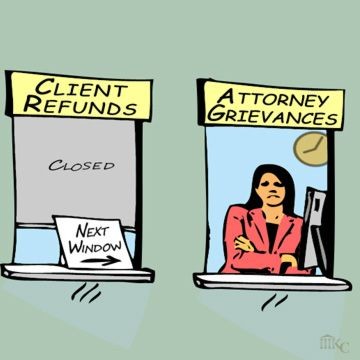The Lawyer's Lawyer
Dollars & Sense
Q. After ordering numerous revisions to her will, my client changed her mind yet again, claimed that my latest draft misstated her wishes, and demanded all of her money back. If I give in, can my refund be used against me?
A. To be precise, you are really asking whether a disciplinary board will hold it against you in the event of a later grievance.
If anything, refunding a dissatisfied client's money will reduce the likelihood of a grievance thereafter. Though disciplinary authorities often lack the authority to order restitution, aggrieved clients view grievance committees as a form of consumer protection agency -- a place to turn when their lawyers shun their demands.
While I have no statistical data, many of the grievances I see present some variation of "my-lawyer-took-my-money-and-did-nothing." In too many instances, refund requests fall on deaf ears, provoke heated arguments, and end with defiant refusals to entertain the gripes of the ungrateful.
When clients ask us to refund all or part of their payments, or to reduce their bills, they are presenting us with opportunities to demonstrate our professionalism and our commitment to client service. This does not necessarily mean that we should acquiesce. But rather than increase the tension with a brash response, we must listen to our clients' concerns, educate them on the value of our services, and explore positive ways to resolve their issues.
As a lawyer, you are a problem solver. To do it well, you must keep a level head when clients seem to lose theirs. While you should confirm all of your communications in writing, few complaints were ever resolved with letters and emails alone. If possible, meet with the client in the presence of a colleague or assistant who may, if necessary, corroborate the conversation later on.
In your case, the client's demand for a refund of fees may mask a deeper problem. Having changed her mind on various bequests, this client may be acting out of fear or other emotions that can interfere with her own best interests. By inviting a conversation about the refund request, you have an opportunity to explore issues which lie beneath the surface and to give this client the type of rational guidance you were retained to provide.
Just like your client, you have asked a question regarding a refund when the real issue cannot be reduced to dollars and cents. If you act professionally in responding to her concerns, you may resolve them in a manner that strengthens your attorney-client relationship, or, at a minimum, will reduce the impact of any grievance she ultimately decides to file.
